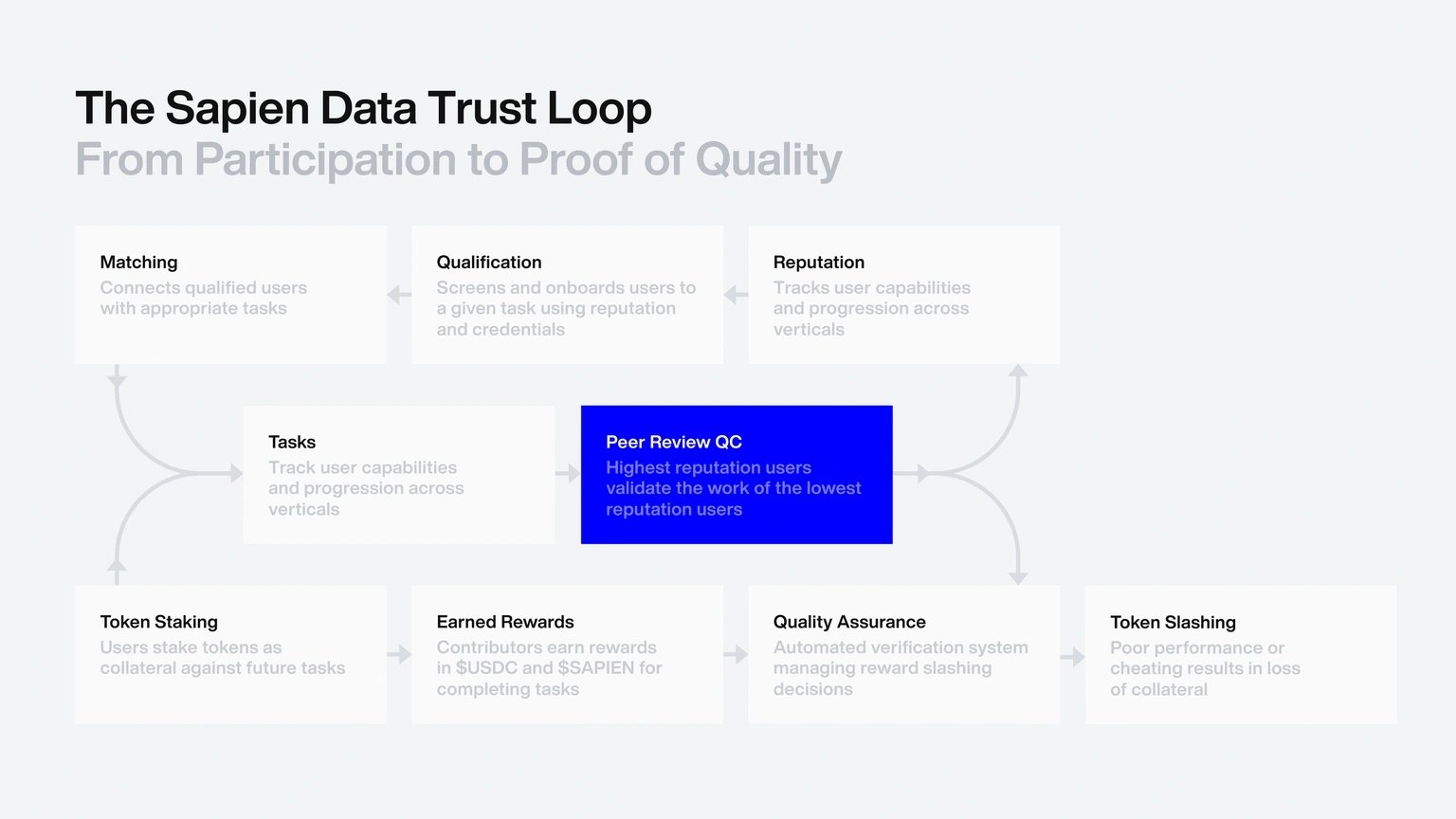订阅 wiki
Share wiki
Bookmark
Sapien
0%
Sapien
Sapien 是一个去中心化数据协议,用于组织和验证人类对 AI 训练的贡献。它使用质押、同行验证和链上声誉系统来大规模地维护数据质量和问责制。 [1]
概述
Sapien 是一个去中心化数据协议,用于组织和验证人类对 AI 训练的贡献。它通过将经济激励与数据准确性和可靠性对齐,来解决大规模质量保证的挑战。该系统通过质押、验证、声誉和激励机制运作。贡献者质押代币以访问任务,他们的工作由同行审查以确保质量。重复的准确性会建立声誉,从而解锁更高价值的机会,而较差的表现会导致惩罚。通过这种结构,Sapien 用链上框架取代了中心化质量控制,该框架强制执行问责制,通过同行评审验证数据,并奖励一致的高质量贡献。 [10] [11]
特点

游戏化 AI 训练
Sapien 的贡献者框架引入了一个结构化的、游戏化的晋升系统,该系统将声誉、绩效和经济激励联系起来,以维持可扩展的质量控制。每个参与者根据可衡量的链上绩效指标(如任务准确性、完成量和同行验证反馈)在四个经验级别(学员、贡献者、专家和大师)中晋升。声誉评分范围从 0 到 1000,并不断更新,作为技能和可靠性的透明记录。
新用户从学员 (0–199) 开始,在监督下完成基础任务。此阶段不需要质押,但必须保持至少 90% 的准确率,并且任务量上限为 100,以确保在晋升之前保证质量。贡献者 (200–599) 处理标准数据任务并开始参与验证。需要 250 $SAPIEN 的质押,并且贡献者必须保持至少 95% 的准确率。他们可以获得适度的奖励倍数,并承担有限的同行评审职责。
专家 (600–799) 代表经验丰富、表现出色的参与者,他们满足 98% 的准确率阈值并质押 5,000 SAPIEN,并且最低准确率为 99%,他们可以完全访问所有工作流程,获得最高的奖励倍数,并且可以参与协议治理。 [12]
质量证明
质量证明是 Sapien 的核心系统,用于确保人类生成数据的可靠性和问责制。它用去中心化框架取代了传统的监督,在该框架中,贡献者通过质押、同行验证和透明的链上声誉来证明他们的可信度。在完成高级任务之前,用户必须锁定 $SAPIEN 代币作为抵押品—为经过验证的工作赚取奖励,或因低质量的输出而损失部分质押。这种财务对齐将代币转换为活跃资本,确保整个网络的一致性能和质量保证。
质量控制通过分层同行验证来维护,其中排名较高的贡献者审查排名较低的贡献者的工作。准确的验证者会获得奖励,而批准不良提交会导致处罚或削减。任务奖励受三个因素影响:复杂性、绩效排名和质押配置。更大和更长的质押会获得更高的倍数,而表现最佳者会获得额外的奖金。相反,重复的错误或不当行为可能导致再培训、减少质押或永久移除。通过这种模式,Sapien 构建了一个可扩展的、基于信任的系统,该系统通过透明的、绩效驱动的激励措施来维护数据完整性。 [13]
推荐计划
Sapien 的推荐系统通过奖励引入新的、表现出色的参与者的贡献者来鼓励网络增长。推荐奖励取决于被推荐用户的质量和生产力,而不仅仅是注册。贡献者可以赚取被推荐人收益的 1% 到 5%,最长可达 12 个月,具体取决于他们引入的活跃、经过验证的参与者数量。只有满足准确性和声誉要求的推荐才能产生奖励,而欺诈或不活跃的帐户将被排除在外,以维护数据质量。
推荐计划与更广泛的网络扩展工作相结合,重点是可持续扩展。这些包括与其他协议和数据提供商的合作、与身份验证系统的集成以及跨协议声誉框架。区域计划支持本地化的入职培训和具有文化特定性的任务池,而培训和认证计划可帮助贡献者发展专业技能。这些措施共同旨在发展一个全球性的、去中心化的贡献者基础,该基础能够生成可靠的、高质量的数据。 [14]
治理
Sapien 的治理框架旨在从核心贡献者监督过渡到社区驱动的决策。最初由创始开发人员管理,权力将逐渐转移到去中心化自治组织 (DAO),代币持有者可以通过链上投票参与制定协议策略。治理职责包括财务管理、赠款分配、协议参数更改以及批准新的任务类型或升级。投票权预计将与 $SAPIEN 代币所有权保持一致,并以参与和委托机制为指导,这些机制会随着网络成熟而发展。
为了保持透明度并降低风险,该协议纳入了持续的监督措施。这些措施包括定期安全审计、可公开访问的治理和绩效仪表板、详细的财务披露以及与独立的法律、运营和网络安全顾问的合作。该结构旨在维护问责制,确保系统可靠性,并在没有集中控制的情况下支持长期网络稳定性。 [15]
SAPIEN
$SAPIEN 代币是该协议激励和治理系统的核心组成部分。它具有多种用途——通过质押授予贡献者访问任务的权限、奖励绩效以及确定参与决策过程的权限。
贡献者质押 $SAPIEN 以获得工作资格,根据任务质量和一致性赚取代币,并再投资他们的收益以获得更高级别的机会。声誉和质押持有量共同影响盈利潜力和治理权,从而创建一个持续的循环,使贡献者绩效与协议的长期可持续性保持一致。 [16]
代币经济学
SAPIEN 的总供应量为 10 亿个代币,其分配如下: [16]
- 支持者/投资者: 26.82%
- 团队和顾问: 20.18%
- 贡献者奖励: 15%
- 社区金库: 13%
- 季节性空投: 13%
- 流动性激励: 7%
- 质押激励: 5%
融资
Sapien 在种子轮融资中筹集了 1050 万美元,由 Variant 领投,Primitive Ventures、Animoca、Yield Guild Games、HF0 和几位天使投资人参与。这笔资金用于支持 Sapien 的去中心化数据平台的开发,该平台将寻求 AI 训练数据的企业与分布式的人类贡献者网络连接起来。该公司旨在通过使全球个人能够直接从其设备执行数据创建和验证任务来解决传统数据设施中的可扩展性限制,并通过链上激励和验证机制来强制执行质量。
在融资时,Sapien 的网络包括来自 70 个国家/地区的贡献者,其中包括来自医学、法律和软件工程等领域的专业人士的参与。该公司已获得 17 家企业客户,包括财富 500 强组织,涵盖自动驾驶、教育和医学研究等行业。这些资金被分配用于加强协议的基础设施,优化企业的数据匹配工具,以及与 OpenLedger 合作开发 AI-20,这是一种用于去中心化训练数据的互操作性标准。 [17]
合作伙伴
发现错误了吗?
